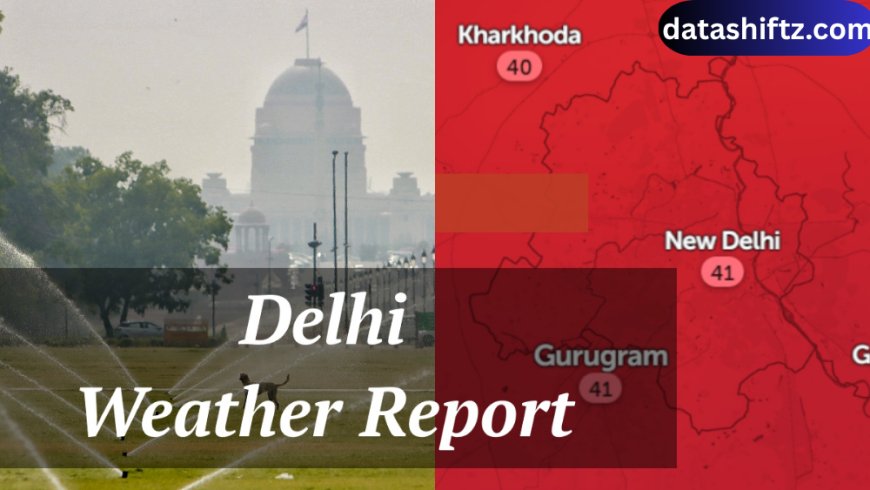Delhi Weather Today: An In-Depth Analysis

Introduction
Delhi, the capital city of India, is known not just for its rich history, vibrant culture, and political significance, but also for its extreme weather conditions. From the scorching summers to chilly winters and the refreshing yet humid monsoon season, Delhi’s climate has always been a topic of discussion among its residents and visitors.
Understanding Delhi weather today is essential not only for planning daily activities but also for health, travel, and business decisions. The city’s weather is influenced by geographical factors such as its location in the Indo-Gangetic plain, pollution levels, and seasonal winds.
This article explores the current weather in Delhi, its historical context, seasonal variations, and its impact on daily life, along with tables and lists for easy reference.
Delhi Weather Today: Current Situation
Temperature, Humidity, and Air Quality
As of today, Delhi is experiencing moderate weather conditions, though they vary depending on the season. On most days, the temperature fluctuates between mornings and evenings, with afternoons often hotter or colder depending on the time of year.
Delhi Weather Snapshot Today
| Weather Parameter | Value (Approx.) |
|---|---|
| Temperature | 32°C (Day) / 22°C (Night) |
| Humidity | 60% |
| Wind Speed | 10 km/h (North-West winds) |
| Precipitation | 10% chance of rain |
| Air Quality Index | 180 (Moderate to Poor range) |
| Sunrise | 6:10 AM |
| Sunset | 6:05 PM |
While the temperature seems moderate, the air quality index (AQI) is often in the unhealthy category, making air pollution a bigger concern than weather itself.
Seasonal Weather in Delhi
Summer, Monsoon, Winter, and Spring
Delhi’s weather can be broadly divided into four major seasons, each with distinct characteristics:
1. Summer (April – June)
-
Extremely hot, with temperatures rising above 45°C.
-
Dry winds called loo make afternoons unbearable.
-
Water intake and protective measures are necessary.
2. Monsoon (July – September)
-
Brings relief from the heat with heavy rains.
-
Average rainfall: 700–800 mm annually.
-
High humidity can cause discomfort.
3. Winter (November – February)
-
Known for chilly winds and fog.
-
Temperatures can drop to 4–5°C.
-
Severe smog and AQI issues worsen during this period.
4. Spring / Autumn (March, October)
-
Pleasant weather with moderate temperatures.
-
Best season for tourism and outdoor activities.
Impact of Weather on Daily Life
Health, Transport, and Lifestyle
The weather in Delhi today directly affects its residents in many ways:
Impacts of Delhi Weather
-
Health Concerns: Respiratory issues due to poor AQI, dehydration in summer, flu in winter.
-
Transport: Fog delays flights and trains in winter; rains cause waterlogging in monsoon.
-
Tourism: Pleasant weather in October-March boosts travel, while summers discourage tourists.
-
Lifestyle: Choice of clothing, diet, and outdoor activities depend heavily on the weather.
-
Work Productivity: Harsh summers and pollution impact outdoor labor and businesses.
-
Festivals: Major festivals like Diwali (winter) and Holi (spring) align with seasonal changes.
-
Energy Consumption: High AC use in summer and heaters in winter increase electricity demand.
-
Agriculture: Monsoon rains support nearby farming, but excess rain leads to crop loss.
-
Public Safety: Heatwaves and smog often lead to health advisories by the government.
-
Daily Planning: Commuters check AQI and temperature updates before stepping out.
Historical Weather Trends in Delhi
Climate Records and Changes
Delhi’s weather has undergone noticeable changes over decades due to climate change and rising pollution levels.
Historical Weather Data (Approx.)
| Decade | Avg. Summer Temp | Avg. Winter Temp | AQI Status |
|---|---|---|---|
| 1980s | 38°C | 8°C | Clean / Moderate |
| 1990s | 40°C | 7°C | Moderate to Poor |
| 2000s | 42°C | 6°C | Poor / Very Poor |
| 2010s | 44°C | 5°C | Very Poor / Severe |
| 2020s | 45°C+ | 4°C | Hazardous Levels |
Rising temperatures and declining air quality show how urbanization and industrialization have worsened Delhi’s climate.
Precautions for Residents
Staying Safe in Delhi Weather Today
Delhi residents adapt their lifestyle to cope with changing weather conditions.
Safety Precautions
-
Carry masks during high pollution days.
-
Drink plenty of water in summer.
-
Use sunscreen and protective clothing during heatwaves.
-
Install air purifiers at home for clean breathing.
-
Avoid unnecessary travel during foggy mornings.
-
Consume immune-boosting foods in winter.
-
Keep emergency medicines for respiratory issues.
-
Follow government weather and AQI advisories.
-
Stay indoors during extreme heatwaves or dust storms.
-
Encourage green initiatives to fight climate change.
Future Outlook of Delhi’s Climate
Predictions and Concerns
Climate experts predict that Delhi will continue to face increasing challenges such as:
-
Longer summers with rising maximum temperatures.
-
Erratic rainfall patterns due to climate change.
-
Severe smog episodes in winters.
-
Increasing urban heat island effect.
Future Climate Concerns
| Aspect | Prediction for Delhi 2030 |
|---|---|
| Avg. Summer Temp | 46–47°C |
| Avg. Winter Temp | 3–4°C |
| Rainfall Pattern | Erratic, uneven |
| AQI Status | Severe / Hazardous |
| Public Impact | Increased health risks |
Immediate measures in pollution control, afforestation, and sustainable urban planning are needed to improve Delhi’s weather conditions.
Conclusion
Delhi’s weather today is not just about temperature and rainfall, but also about air quality, lifestyle impacts, and climate concerns. While the capital city continues to thrive as India’s cultural and political hub, its weather remains a daily challenge for residents.
-
Summers bring extreme heat.
-
Monsoons bring relief but also waterlogging.
-
Winters bring chill and smog.
-
Spring offers a short window of pleasant weather.





























